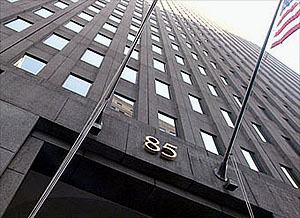 The New York Times reports today that President Obama plans to propose a limit on bank size — which could be very good idea if it’s implemented properly — and then go straight for Wall Street’s jugular:
The New York Times reports today that President Obama plans to propose a limit on bank size — which could be very good idea if it’s implemented properly — and then go straight for Wall Street’s jugular:
He also would prohibit proprietary trading of financial securities by commercial banks, including mortgage-backed securities….The president will speak at an appearance on Thursday at the White House […] after a meeting with Paul Volcker, the former Federal Reserve Board chairman, who has been campaigning for months for legislation that would separate commercial banking from proprietary trading. A similar discussion is percolating in Europe, led by Mervin King, head of the Bank of England.
….Now, in perhaps his most daring move, he is calling for a modern-day version of the Glass-Steagall Act, which in 1933 separated commercial and investment banking. The new separation would prohibit standard commercial banks from engaging in proprietary trading using funds from their commercial division.
Only a handful of large banks would be the targets of this legislation, among them Citigroup, Bank of America, J.P. Morgan Chase and Wells Fargo. Goldman Sachs, the Wall Street trading house, became a commercial bank during this latest crisis, and it would presumably have to [give] up that status.
This is potentially very good news if Congress is willing to act on it. For background, here’s my lament in “Capital City,” my piece in the current issue of the magazine about the power of the finance lobby to prevent serious regulatory change:
The simplest, most striking proposals for reining in bank behavior aren’t even getting a serious hearing. Former Fed chairman Paul Volcker, for example, suggests that commercial banks should simply be banned from securities trading altogether. They should go back to making loans and underwriting bonds, but leave the risky, leverage-heavy trading to hedge funds, where it’s fire-walled away from the plumbing of the overall banking system. Another former Fed chairman, Alan Greenspan, thinks we should break up big banks the same way we broke up Standard Oil 100 years ago. “If they’re too big to fail, they’re too big,” he said in October. Other economists have proposed a small tax on all financial transactions (perhaps a quarter of a percent or so), something that could reduce short-term speculation and help reduce the long-term deficit all at once.
But those reforms were never even considered….
Well, two out of three isn’t bad. And since Obama’s bank tax is sort of a second cousin to the transaction tax, call it two and a half.
But here’s an interesting question: in order to save their skins, Morgan Stanley and Goldman Sachs applied to become commercial banks back in 2008. This gave them access to the Fed discount window as well as the ability to participate in a bunch of other Fed programs. So if Obama’s proposal is passed, can they just decide to stop being commercial banks because they don’t like the new regulation? Do we really want to set a precedent that you can convert your charter when you’re in trouble, get bailed out, and then convert back whenever you feel like it? Or should we tell Goldman and Morgan Stanley that they should stop doing proprietary trading too? After all, investment banks caused at least as much trouble as commercial banks in the runup to the crisis.
This is probably just idle speculation, since I don’t think Volcker or anyone else intends for investment banks to be barred from proprietary trading. But if they aren’t, I’d sure like to see them become subject to some fairly strict leverage rules instead. Ditto for big hedge funds and private equity funds. A guy can dream, can’t he?
POSTSCRIPT: Simon Johnson is cautiously optimistic: “The major question now is — will the White House have the courage of its convictions and really fight the big banks on this issue? If the White House goes into this fight half-hearted or without really understanding (or explaining) the underlying problem of unfettered banks that are too big to fail, they will not win.”














